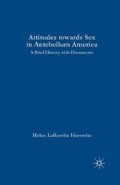Abstract
First printed in English in 1684, Aristotle’s Master-piece offers a view into vernacular sexuality, the first framework for the public deliberation of sex. Taking the name of Aristotle to lend authority, this anonymously written work contained medical information from many different sources, including popular folklore. It was the most common guide to reproduction and sexual matters in America in the eighteenth and early nineteenth centuries. In keeping with medical thought at the time, the body is seen as governed by the four fluids (or humors). Blood combined with heat was the source of sexual desire. Man was the hotter, drier, and lustier sex; woman, the cooler and moister Women’s anatomy and desire were etched along the lines of a one-sex model, in which a woman is a man outside-in.
Access this chapter
Tax calculation will be finalised at checkout
Purchases are for personal use only
Preview
Unable to display preview. Download preview PDF.
Copyright information
© 2006 Bedford/St. Martin’s
About this chapter
Cite this chapter
Horowitz, H.L. (2006). Voices in the Sexual Conversation: The Four Frameworks. In: Attitudes toward Sex in Antebellum America. The Bedford Series in History and Culture. Palgrave Macmillan, New York. https://doi.org/10.1007/978-1-137-05413-5_2
Download citation
DOI: https://doi.org/10.1007/978-1-137-05413-5_2
Publisher Name: Palgrave Macmillan, New York
Online ISBN: 978-1-137-05413-5
eBook Packages: Palgrave History CollectionHistory (R0)

